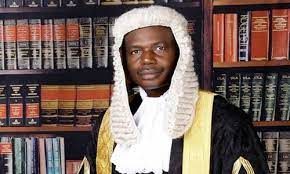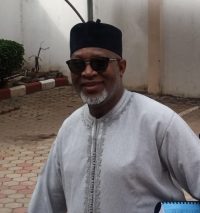By Ebun-Olu Adegboruwa, SAN
Stakeholders’ Responsibilities in Educational Development
Attainment of quality education in Nigeria requires continuous and all-round improvement which informs the collaboration of all stakeholders in the education sector.
As such, governments at all levels, teachers/ school-administrators, students, parents, as well as international agencies and pressure groups, have their respective roles to play in educational development.
We shall therefore be highlighting the roles and responsibilities of some critical stakeholders in educational development.
The Government
By the social contract principle, the sole essence of a government is to serve the will of the people who are the source of all political power of a State (by State we mean a country).
Whereas the citizens have a reciprocal duty to obey the law and submit to a sovereign authority, the sovereign (which is the Government) on the other hand is committed to the good and wellbeing of its citizens.
As shown from the preamble of the 1999 Constitution of the Federal Republic of Nigeria, the basis for the existence of the geo-political entity called Nigeria is for the promotion of good government and welfare of all persons in Nigeria on the principles of Freedom, Equality and Justice.
The 1999 Constitution provides the basic legal framework for all the three tiers of government: Federal, State and Local to participate in the management and provision of education.
Chapter II of the 1999 Constitution encapsulates the fundamental objectives and state policy on education to which the Nigerian Government is obligated to pursue.
Specifically, Section 18 of the 1999 Constitution gives an insight into the Government’s goals and blueprint for education in Nigeria. It states as follows:
i. Government shall direct its policy towards ensuring that there are equal and adequate educational opportunities at all levels.
ii. Government shall promote science and technology.
iii. Government shall strive to eradicate illiteracy; and to this end Government shall as and when practicable provide –
(a) Free, compulsory and universal primary education
(b) Free university education and
(c) Free adult literacy programme.
From the aforementioned educational objectives the roles and responsibilities of the Government is not far-fetched.
The Government (both Federal and State) is obligated to provide and guarantee free education to every Nigerian citizen up to university level. In essence, by the provisions of Chapter II of the 1999 Constitution, every Nigerian citizen is entitled to the provisions of equal and adequate education at all levels.
It is in partial fulfillment of its duty to provide education for all citizens that the Federal Government issued a National Policy on Education, 6th edition (NPE). Under the NPE, the specific goals of education in Nigeria are to:
a. Ensure and sustain unfettered access and equity to education for the total development of the individual:
b. Ensure the quality of education delivery at all levels;
c. Promote functional education for skill acquisition, job creation and poverty reduction;
d. Ensure periodic review, effectiveness and relevance of the curriculum at all levels to meet the needs of society and the world of work;
e. Collaborate with development partners, the private sector, Non-Governmental Organizations and local communities to support and fund education; and
f. Promote information technology capability at all levels.
It is, therefore, no gainsaying that the Government remains the central force in the development of the educational sector of any nation to which Nigeria is not an exception. The Federal and State Governments are saddled with the critical role to ensure that no person suffers any form of disenfranchisement in basic and quality education regardless of the status, financial background or location in Nigeria.
The Government is therefore mandated to cause the proper distribution and deployment of funds and facilities to enable an educational environment for all citizens of Nigeria. The four key areas to which the Government must not be found wanting are: (i) Availability of functional educational institutions and programmes with trained and efficient teachers.
This involves capital funding on the annual budget for education. In a recent report culled from the archives of the Federal Ministry of Education, it shows that at present, the Federal Government takes around 80% responsibility while the private and non-state actors account for over 20% of total expenditure on education.
Evidently, the present funding of the educational sector is still below the recommended percent of the total budget of the Federal Government. While the United Nations Education, Scientific and Cultural Organization (UNESCO) recommends that governments should invest about 26% of their annual budgets on education, in Nigeria we spend an average of 7% of the annual budget on education.
(ii) Accessibility to educational institutions and programmes by everyone without discrimination.
The Government must ensure education is accessible to all, especially the most vulnerable groups without discrimination on any of the prohibited grounds. Hence, the quota policy to which some members of the society are excluded from equal and adequate educational opportunities are wrong and unlawful.
The issue of legality of quota policy was finally decided by the Court on December 17, 2014 in Olisa Agbakoba v Minister of Education(unreported) Suit No: FHC/L/CS/898/2013 wherein the Federal High Court in a well-considered decision held that quota policy or disparity in admission requirement into federal government colleges was a violation of section 42 (1) of the Constitution. Consequently, the Court ordered the Federal Government to apply uniform admission requirements, especially cut off marks to all candidates seeking admission into unity schools across the country.
Furthermore, education has to be within safe physical reach either by attendance at some reasonably convenient location or via modern technology e.g. online learning programme. (iii) Acceptable form and substance of education including curricula and up to date teaching methods upon which students receive equality training and teaching,
Government must ensure that relevant curriculum is implemented in schools and also see to it that such curriculum is constantly reviewed in line with market demands; and (iv) Adaptability – education has to be flexible so it can adapt to the needs of changing and evolving societies and respond to the needs of students with diverse social and cultural settings.
The Government must always have the interest of the students at heart in drawing up regulations and policies affecting education.
POLITICAL PARTIES AND PRESSURE GROUPS
There is always a certain motive to be achieved when a group of people come together. Indeed, this has been particularly helpful because it gives room for unity of purpose.
Be that as it may, a pressure group is formed to influence the government while political parties constitute a voluntary organized group of individuals dedicated to similar political ideology.
Whereas political parties nominate candidates, contest elections and form government to rule over the citizens, pressure groups are organized with a view to lobbying the government so as to enjoy certain benefits. Pressure Groups are not in alignment with any political party, but they have the power to influence government decisions.
These are formed to express the shared values and beliefs of a large group, as well as to effect change within the government. Indeed, these give an opportunity and a voice to that class of people who remain underprivileged. Consequently, the democratic process is strengthened.
Pressure Groups take resort to agitational measures to achieve their objectives, which include marches, petitions, processions, demonstrations, fasts, strikes, and even boycotts. The importance of a political party in any country cannot be underestimated. They are the force of movements behind any political decision of the country. If there is a party in the country, then it implies the elective nature of the government.
Political parties through elected representatives in the Legislature and Executive formulate, adopt and implement public policies which affect the citizens and the governed in Nigeria. As such all, Government policies, systems and regulations flow from the political will as dictated by the respective political parties in power.
As stipulated under Section 224 of the 1999 Constitution, all programmes, aims and objects of a political party in Nigeria must conform with the provisions of Chapter II of the 1999 Constitution. Invariably, political parties are mandated to formulate their policies and manifestoes in line with the Fundamental Objectives and policies on Education as stipulated in Section 18 of the 1999 Constitution.
As such political parties are obligated to use their influence in directing the provision of free, equal and adequate education to every Nigerian citizen up to university level.
The prominent role played by political parties and pressure groups in the 1950s- 1970s in Nigeria, particularly in the Western Region has remained an invaluable contribution to the development of education in most western states in Nigeria.
Under the leadership of Chief Obafemi Awolowo, the Action Group birthed their Democratic Socialism ideology on the need to guarantee potential equality through equal opportunity for all. Upon winning the first election to the Western House of Assembly in 1952, the Action Group made it clear to the parliament that its government would give priority to education amongst others.
As such by 1955 the Universal Free Primary Education scheme was introduced in the whole of Western Region in Nigeria whereby Free Primary Education was made compulsory for all children between 5 – 13 years of age.
The launching of this scheme heralded the positive change in the educational history of Nigeria whereby there was rapid numerical growth of schools at all levels: primary, secondary (modern and grammar), expansion of teacher training institutions and most of all rapid growth in the school population at all levels.
It was due to the political will and policy of the Action-Group led government in the Western Region that the budgetary allocation to education was given top most priority.
For instance, an average of 35% of the total recurrent budget each year between 1954 and 1959 was allocated to education. Education attracted the largest share of the Western Region’s recurrent budget, which varied between 28.9% and 41.2% during the period.





